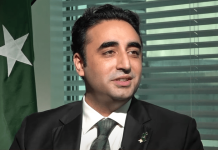Staff Report
ISLAMABAD: Minister for Planning, Development and Special Initiatives Professor Ahsan Iqbal on Wednesday stressed the urgent need to keep pace with the global digital revolution to achieve development across all sectors and put the country on a sustainable growth trajectory.
“The world is advancing at the speed of electrons. We cannot afford to lag behind, as in the next 22 years, we will be evaluating our development in the context of our 100 years of independence,” he stated while addressing the opening session of the conference titled “Empowering a Digital Pakistan.”
Citing historical examples, the minister noted that nations embracing global changes achieved progress and prosperity, while those that ignored these changes faced failure.
He highlighted that the world was now undergoing a digital revolution after the industrial revolution. “In the industrial era, the big used to eat the small; in the digital world, the fast eats the slow, regardless of size,” he remarked.
“Today, Pakistan stands at a defining moment. The future of a nation or an individual hinges on the choices made. These choices determine the destiny of that person or nation,” he said.
Ahsan Iqbal explained that if the choices were wrong, one could not blame others for their circumstances. Conversely, if the choices are right, the credit for success belongs solely to the individual or nation that made those choices, he added.
He also pointed out that Pakistanis were once known globally for their hardworking and intelligent reputation. However, this image was tarnished by the previous government of Pakistan Tehreek-i-Insaf (PTI), which labeled its opponents as “thieves and dacoits.”
In 2018, he noted, ambassadors from major countries, including the United States, Britain and European states, were actively seeking investment opportunities in China-Pakistan Economic Corridor (CPEC) projects. “For the first time, Pakistan was the darling of international investors, eager to be part of CPEC, but we squandered this opportunity by entrusting power to the PTI,” he said.
He recalled that the PML-N government had introduced Vision 2010 in 1998 and Vision 2025 in 2013 but was later disrupted by the so-called change in 2018.
Subsequently, the minister said, the governance was handed over to someone with no experience even at the union council level, severely damaging the national economy. “The negative impact of this decision is still being felt.”
Emphasizing the importance of adapting to modern trends and maintaining agility, he reminded that no country has achieved development without consistent policies over at least 10-15 years.
To achieve developmental goals, Ahsan Iqbal reiterated that Pakistan needed peace, stability, consistent policies and continuous reforms.
“The nation now needs a healing touch. We must come together, set aside smaller identities, and embrace a larger identity as Pakistan,” he remarked quoting “Coming together is a beginning; staying together is progress and working together is success.”






